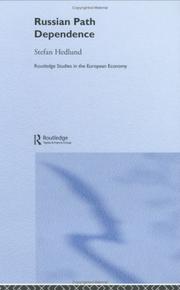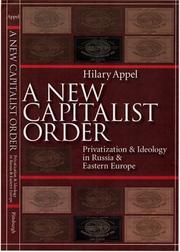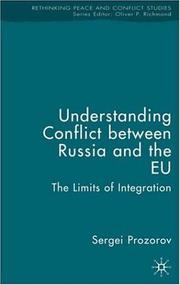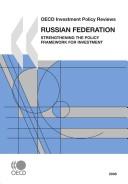| Listing 1 - 10 of 26 | << page >> |
Sort by
|
Book
ISBN: 1783330864 9781783330867 Year: 2013 Publisher: Luton Andrews UK
Abstract | Keywords | Export | Availability | Bookmark
 Loading...
Loading...Choose an application
- Reference Manager
- EndNote
- RefWorks (Direct export to RefWorks)
In 1917 Czarist Russia collapsed during the catastrophe of the First World War, but the tensions that had accumulated inside the empire for a century due to the challenges that modernisation presented were the real seeds of her undoing. The 19th Century was a battle for the soul of Russia, and it decided whether she would embrace liberal democracy and industrialisation like her contemporaries in Europe, or whether she would retreat into the past. In fact, she did both, and the human legacy o...
Book
Year: 2000 Publisher: New York : Columbia University Press,
Abstract | Keywords | Export | Availability | Bookmark
 Loading...
Loading...Choose an application
- Reference Manager
- EndNote
- RefWorks (Direct export to RefWorks)
Roy Medvedev, one of the world's best-known Russian scholars and a former consultant to both Gorbachev and Yeltsin analyzes the main events that have transpired in the Russian federation since late August 1991. He looks at the plans that were meant to

ISBN: 9780415354004 0415354005 041565159X 1134259182 1280168765 0203000420 9780203000427 9781134259182 9781280168765 9781134259137 9781134259175 9780415651592 1134259174 Year: 2005 Volume: 15 Publisher: London New York Routledge
Abstract | Keywords | Export | Availability | Bookmark
 Loading...
Loading...Choose an application
- Reference Manager
- EndNote
- RefWorks (Direct export to RefWorks)
Russia's transition to a market economy has been tortuous to say the least. However, this book argues that the arguments and counter-arguments that pitch shock therapy against gradualism are wide of the mark and quite pointless.Indeed, the reasons for the warped outcomes can actually be traced back through the long sweep of Russian history. Decisions made in the distant past can fully influence policy- making in the present. Hedlund's thesis can, like this, be seen as influenced by the 'path dependency' theories of Paul David among others.
Russia (Federation) --- Russia --- Russie --- Economic policy --- History --- Politique économique --- Histoire --- Russia - History. --- Russia (Federation) - Economic policy - 1991-. --- Russia (Federation)-- Economic policy-- 1991-. --- Economic History --- Business & Economics --- History. --- Politique économique
Book
ISBN: 9780815718314 0815718314 9786612131172 1282131176 0815701616 Year: 2008 Publisher: Washington, D.C.: Brookings Institution,
Abstract | Keywords | Export | Availability | Bookmark
 Loading...
Loading...Choose an application
- Reference Manager
- EndNote
- RefWorks (Direct export to RefWorks)
"Looks at Russian government's push toward a knowledge-based economy, particularly in the manufacturing sector. Quantifies and benchmarks sector's relative strengths, identifying opportunities to increase Russian productivity and competitiveness. Examines underlying firm-level determinants of knowledge absorption, competitiveness, and productivity, with an eye to improving workers' skill levels and the investment climate"--Provided by publisher
Book
ISBN: 9264054340 9264054332 Year: 2009 Publisher: Paris : OECD,
Abstract | Keywords | Export | Availability | Bookmark
 Loading...
Loading...Choose an application
- Reference Manager
- EndNote
- RefWorks (Direct export to RefWorks)
OECD's periodic survey of the Russian economy. This 2009 edition includes chapters on stabilisation and renewed growth, growth-friendly fiscal policy, more flexible exchange rate policy and more effective monetary policy, making the banking sector more efficient and resilient, and improving regulation in goods and services markets.

ISBN: 0822958554 1306944430 0822972662 9780822972662 9780822958550 Year: 2004 Publisher: Pittsburgh: University of Pittsburgh Press,
Abstract | Keywords | Export | Availability | Bookmark
 Loading...
Loading...Choose an application
- Reference Manager
- EndNote
- RefWorks (Direct export to RefWorks)
"A New Capitalist Order breaks with mainstream empirical studies of privatization in the Soviet Union and Eastern Europe, arguing that privatization was designed and implemented by pro-market reformers not only to distribute gains and losses to powerful supporters, but also to advance a decidedly Western, liberal vision of the new postcommunist state. Moreover, specific ideologies - such as anticommunism, liberalism, or nationalism - profoundly influenced the legitimacy, the power, and even the material preferences of key economic actors and groups within the privatization process."--Jacket.
Privatization --- Russia (Federation) --- Czech Republic --- Economic policy --- Economic policy. --- E-books --- Privatization - Russia (Federation) --- Privatization - Czech Republic --- Russia (Federation) - Economic policy - 1991 --- -Czech Republic - Economic policy --- Since 1991

ISBN: 140399689X 1349545880 9786610826445 1280826444 0230625339 9781403996893 Year: 2006 Publisher: Basingstoke: Palgrave MacMillan,
Abstract | Keywords | Export | Availability | Bookmark
 Loading...
Loading...Choose an application
- Reference Manager
- EndNote
- RefWorks (Direct export to RefWorks)
'Understanding Conflict between Russia and the EU' addresses the conflictual issues in EU-Russian relations and presents an innovative theory for the understanding of their emergence. Drawing on up-to-date research data, the author argues that conflicts in EU-Russian relations are generated by the clash of principles of state sovereignty and international integration, which characterize the policies of both sides.
European Union --- Russia (Federation) --- Europe --- Relations --- Economic policy --- Russia (Federation) - Relations - Europe --- Europe - Relations - Russia (Federation) --- Russia (Federation) - Economic policy - 1991 --- -European Union --- -Russia (Federation) - Relations - Europe --- -Russia (Federation)
Book
ISBN: 1283104962 9786613104960 1136850775 0203834623 9780203834626 9780415603447 0415603447 9781136850721 9781136850769 9781136850776 9781138993259 1136850767 Year: 2011 Publisher: New York (N.Y.): Routledge,
Abstract | Keywords | Export | Availability | Bookmark
 Loading...
Loading...Choose an application
- Reference Manager
- EndNote
- RefWorks (Direct export to RefWorks)
This book provides a comprehensive overview of Russia's difficult economic transition from a command economy since the early 1990s. It covers the financial crisis of August 1998 and the global financial crisis a decade later. Key subjects covered include economic transition, privatization and liberalization; changes in land ownership and agriculture; energy ; foreign direct investment ; economic stabilization ; and economic performance. Russia is well endowed with raw materials, especially oil and natural gas ; this book argues that in some ways this has not helped Russia's attempts to become a more diversified and high-tech economy. Overall, the book demonstrates how much the Russian economy has changed in the period. It continues - and adds to -- the overview of developments in the author's The New Russia (2002), and is the companion volume to Political Developments in Contemporary Russia (2011) - both published by Routledge.
Russia (Federation) --- Economic conditions --- Economic policy --- 331.30 --- 331.31 --- RU / Russia - Rusland - Russie --- Economische toestand --- Economisch beleid --- Russia (Federation) - Economic conditions - 1991 --- -Russia (Federation) - Economic policy - 1991 --- -331.30

ISBN: 0333948580 0333948572 0822327619 0822327708 9780333948583 9780822327707 9780822327615 9780333948576 Year: 2001 Publisher: Houndmills, Basingstoke, Hampshire: Palgrave,
Abstract | Keywords | Export | Availability | Bookmark
 Loading...
Loading...Choose an application
- Reference Manager
- EndNote
- RefWorks (Direct export to RefWorks)
Russia (Federation) --- Russie --- Politics and government --- Economic policy --- Social conditions --- Politique et gouvernement --- Politique économique --- Conditions sociales --- -#SBIB:328H262 --- #SBIB:013.IEB --- -Instellingen en beleid: Rusland en het GOS --- Politique économique --- Russia (Federation) - Politics and government - 1991 --- -Russia (Federation) - Economic policy - 1991 --- -Russia (Federation) - Social conditions - 1991 --- -Russia (Federation) --- -Politics and government

ISBN: 1281784664 9786611784669 9264045988 926404597X Year: 2008 Publisher: [Paris] : OECD,
Abstract | Keywords | Export | Availability | Bookmark
 Loading...
Loading...Choose an application
- Reference Manager
- EndNote
- RefWorks (Direct export to RefWorks)
In 2007, Russia’s international investment flows reached record highs, making Russia one of the world’s largest recipients and sources of FDI. Russia's potential for attracting even more international investment can be improved by strengthening beneficial competition and offering additional opportunities for investment. Disseminating international standard business practices among Russian firms can also boost the country's creditworthiness and reliability as inward and outward investors. Based on the OECD's Policy Framework for Investment, the overview of Russia's energy investment policy identifies different policies critical for coping with the country's huge energy investment needs and sector-specific challenges.
Investments, Foreign -- Government policy -- Russia (Federation). --- Investments, Foreign -- Russia (Federation). --- Investments, Foreign. --- Russia (Federation) -- Economic conditions -- 1991-. --- Russia (Federation) -- Economic policy -- 1991-. --- Investments, Foreign --- Investment & Speculation --- Finance --- Business & Economics --- Government policy --- Russia (Federation) --- Economic conditions --- Economic policy --- Capital exports --- Capital imports --- FDI (Foreign direct investment) --- Foreign direct investment --- Foreign investment --- Foreign investments --- International investment --- Offshore investments --- Outward investments --- Capital movements --- Investments
| Listing 1 - 10 of 26 | << page >> |
Sort by
|

 Search
Search Feedback
Feedback About UniCat
About UniCat  Help
Help News
News